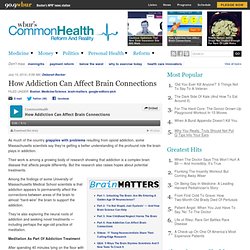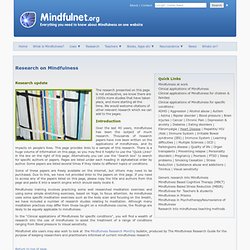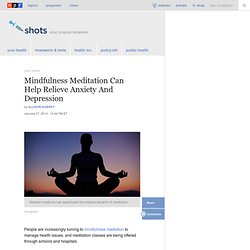

How Meditation Changes the Brain and Body. Forbes Welcome. Mindfulness therapy as good as medication for chronic depression - study. By Kate Kelland LONDON (Reuters) - Mindfulness-based cognitive therapy (MBCT) may be just as effective as anti-depressants in helping prevent people with chronic depression from relapsing, scientists said on Tuesday.

Depression is one of the most common forms of mental illness, affecting more than 350 million people worldwide. It is ranked by the World Health Organization as the leading cause of disability globally. Treatment usually involves either medication, some form of psychotherapy or a combination of both. Yet many patients fail to get better and suffer recurring bouts of illness. MBCT was developed to help such people by teaching them skills to recognize and respond constructively to thoughts and feelings associated with relapse, aiming to prevent a downward spiral into depression.
In the first large study to compare MBCT and anti-depressants, researchers found little difference in outcomes. (Editing by Gareth Jones) chronic depressionWorld Health Organization. How Addiction Can Affect Brain Connections. As much of the country grapples with problems resulting from opioid addiction, some Massachusetts scientists say they’re getting a better understanding of the profound role the brain plays in addiction.

Their work is among a growing body of research showing that addiction is a complex brain disease that affects people differently. But the research also raises hopes about potential treatments. Among the findings of some University of Massachusetts Medical School scientists is that addiction appears to permanently affect the connections between areas of the brain to almost “hard-wire” the brain to support the addiction. They’re also exploring the neural roots of addiction and seeking novel treatments — including perhaps the age-old practice of meditation. Meditation As Part Of Addiction Treatment “I’m irritated,” he said, as several of the 30 other students murmured in agreement. “I can’t really sit this long with my eyes closed without falling asleep,” he added. Dr. Meditation Lowers Stress andSupports Forgiveness Among College Students:A Randomized Controlled Trial.
You're Already Awesome. Just Get Out of Your Own Way!: Judson Brewer MD, Ph.D. at TEDxRockCreekPark. Watch & add to handbook? - irenekraegel - Gmail. How Meditation Changes Your Brain Frequency. As yogis have known for centuries and scientists can now prove, the benefits of meditation are profound.

Meditation is perhaps the most crucial instrument to harness the power of thought, cultivate more peace, clarity and happiness. Learning to train the brain and focus our attention is crucial to thriving and cultivating a peak performance in any endeavor. Longtime psychotherapist Dr. Ron Alexander, author of Wise Mind, Open Mind, speaks of mind strength, or the resiliency, efficacy and emotional intelligence that arise as we begin the process of controlling the mind.
An Antidote for Mindlessness. In the mid-nineteen-seventies, the cognitive psychologist Ellen Langer noticed that elderly people who envisioned themselves as younger versions of themselves often began to feel, and even think, like they had actually become younger.

Men with trouble walking quickly were playing touch football. Memories were improving and blood pressure was dropping. The mind, Langer realized, could have a strong effect on the body. UCLA Mindful Awareness Research Center. The independent mindfulness information website - Research. Research update The research presented on this page is not exhaustive, we know there are 1000s more studies that have taken place, and more starting all the time.

We would welcome citations of other relevant research which we can add to the pages. Introduction Over the last 40 years, mindfulness has been the subject of much research. Thousands of research papers have now been written on the applications of mindfulness, and its impacts on people's lives. Some of these papers are freely available on the internet, but others may need to be purchased. Mindfulness training involves practicing some well researched meditation exercises and using some simple stretching exercises, based on Yoga, to focus attention. Mindfulness Research Guide. Mindfulness Meditation Can Help Relieve Anxiety And Depression : Shots - Health News. Hide captionWestern medicine has questioned the medical benefits of meditation. iStockphoto People are increasingly turning to mindfulness mediation to manage health issues, and meditation classes are being offered through schools and hospitals.

But doctors have questioned whether this ancient Eastern practice really offers measurable health benefits. A fresh review of the evidence should help sort that out. Meditation does help manage anxiety, depression and pain, according to the 47 studies analyzed in JAMA Internal Medicine on Monday, but does not appear to help with other problems, including substance abuse, sleep and weight. "We have moderate confidence that mindfulness practices have a beneficial effect," wrote the author of the paper, Dr. Meditating on Those Sunk Costs. (Photo: Balint Földesi) The sunk-cost fallacy leads to all sorts of poor decision-making — like staying too long at a bad job or refusing to drop out of a hopeless mayoral campaign.

Here’s how Dubner explained it in our podcast on quitting: A “sunk cost” is just what it sounds like: time or money you’ve already spent. Mindfulness and Alcohol Problems in College Students: The Mediating Effects of Stress. Mindfulness Meditation for Increasing Resilience in College Students.